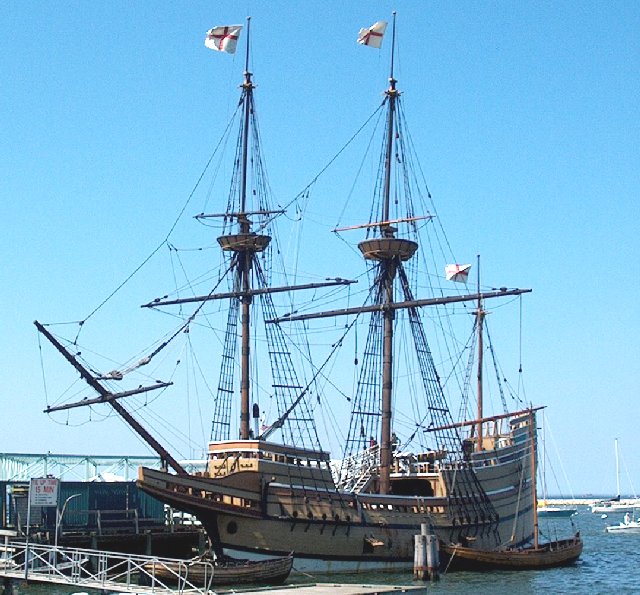The Original Settlement
The past couple of days, I have been interested in the large amount of places in this world named “Plymouth.” Most of the cities named are in the United States, but there are also “New Plymouths” in New Zealand and Canada as well. The original Plymouth was (and still is) located in the country of Devon, England. Although it was a small trading port in the Southwest of the island during the iron age (1000 BCE), it became more prominent during the 1200s. The city has a view of the Sutton Harbor, an important trading outpost that was especially vital during the 100 Years War (1337 to 1453) with France. Interestingly enough, this small town was even mentioned in the Norman Domesday Book, a record of property/taxes created under the regime of William the Conqueror. The town was granted representation to the newly formed English Parliament in 1439 and had an impressive dockyard built. However, the city is most famous for the voyage of the Pilgrims (Puritans that were being persecuted) who left the cold, Saxon shores in 1620 on the notorious Mayflower Ship. They later founded Plymouth Colony in Massachusetts and penned the Mayflower Compact to govern themselves. |
| Plymouth, England http://en.wikipedia.org/wiki/Plymouth |
 |
| Lighthouse in Plymouth, England http://en.wikipedia.org/wiki/Smeaton's_Tower |
New Plymouth, New Zealand
I was surprised upon researching this city because it has a rich history, although it is 11,663 miles from the original Plymouth, England. Maori (the indigenous tribe in New Zealand) had formerly lived in the area now known as New Plymouth (on the west shore of the North Island), but they came into conflict with the invading British traders in 1860. Prior to this, the New Plymouth Company brought English immigrants to the location in order to open a door for imperialist Britain and claim new markets. However, there were disputes within a specific Maori clan about the tribal land of Waitara. The main chief of the area, Teira wanted to sell his portion of the land to the government, but the other dissenting members of the clan refused to have their land taken from them without the consent of every single member of the tribe. Eventually, the leader of the protesters, Wiremu Kingi, became embroiled with the uppity Europeans because they wanted to buy, settle, and exploit the land that Teira was offering. Fighting ensued, the town of New Plymouth became a fortified garrison for the European immigrants, and much of the Maori land was disrupted. The war (called First Taranaki War) ended in the 1870s; the Maori simply became another victim of British interests and imperialism/colonialism. In 1881, most of the tribes were suppressed and admitted Government rule.| Taranaki Volcano, New Plymouth, New Zealand http://en.wikipedia.org/wiki/Mount_Taranaki |
 |
| Maori house, New Plymouth, New Zealand http://en.wikipedia.org/wiki/Marae |
The Fleeing of the Loyalists
Loyalists, those who supported the interests of Britain during the American Revolution, fled the United States when the country became independent and democratic in 1776. Wherever they escaped to, they were sure to name a few new cities (in Canada and in Bahamas) “Plymouth” after the beloved country they still regarded as their sovereign. For example, in Yarmouth County, Nova Soctia, Canada, Loyalists from Shelburne (South in Nova Scotia, Canada) immigrated to this city and named it after the original place in England in 1758. In the Abaco Islands (in the Bahamas, Caribbean), Loyalists also moved here in 1783 from New York. They established cotton farms with African slaves and a small fishing industry; today, tourism booms in the ideal, warm Caribbean resort. There is a city called Plymouth on the island of Montserrat (a British interest in the West Indies), but it was smothered by lava from an active volcano in 1990. |
|
Yarmouth, Nova Scotia, Canada http://en.wikipedia.org/wiki/File:IMG_8531_Yarnouth_morning.jpg |
 |
|
Plymouth, Montserrat, West Indies http://en.wikipedia.org/wiki/File:Plymouth_Montserrat_Heli.jpg |
‘Merica
According to Planet Plymouth (http://www.inplymouth.com), there are 39 towns in the United States named (or including in the name) “Plymouth.” This is undoubtedly an homage to the original American colony in New England, although the states range from Idaho to Florida. Overall, I think it is interesting how one name, from one little city in the rural seaside of England has gained worldwide fame throughout the ages and has been imitated innumerable times. |
|
Plymouth, Massachusetts http://en.wikipedia.org/wiki/Plymouth,_Massachusetts
Sources for my information:
|

No comments:
Post a Comment